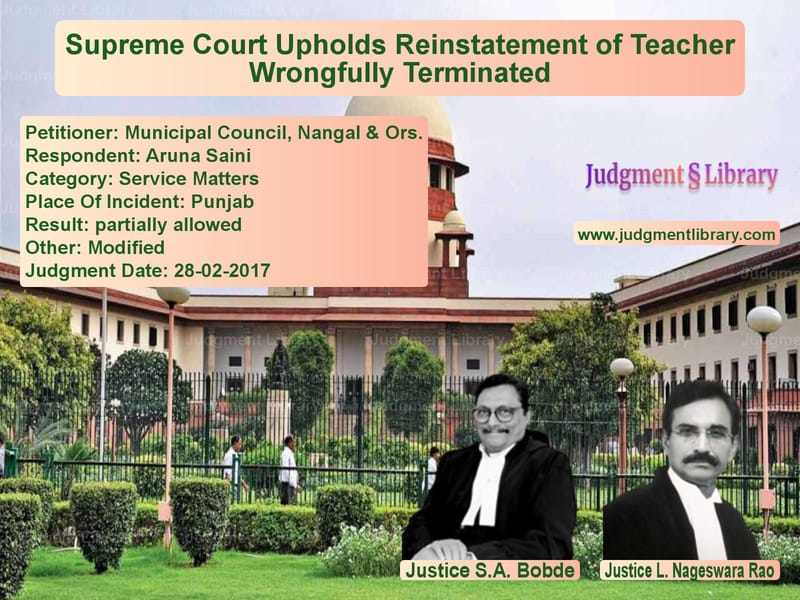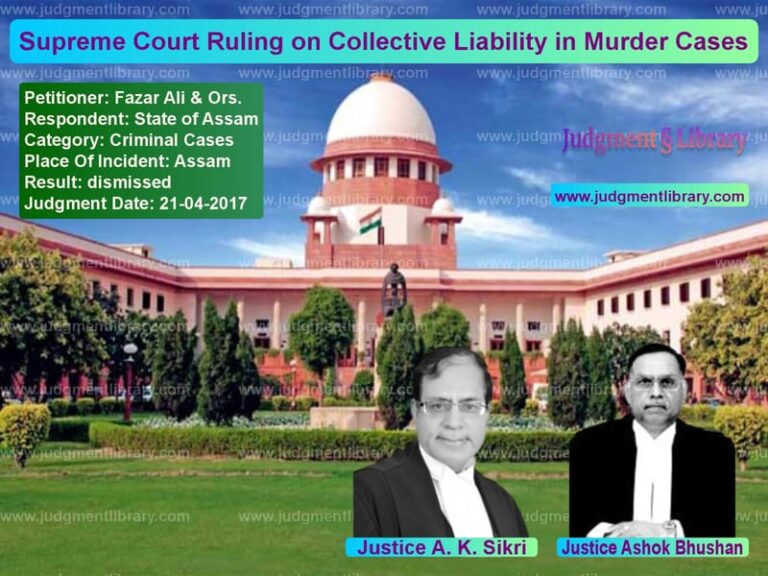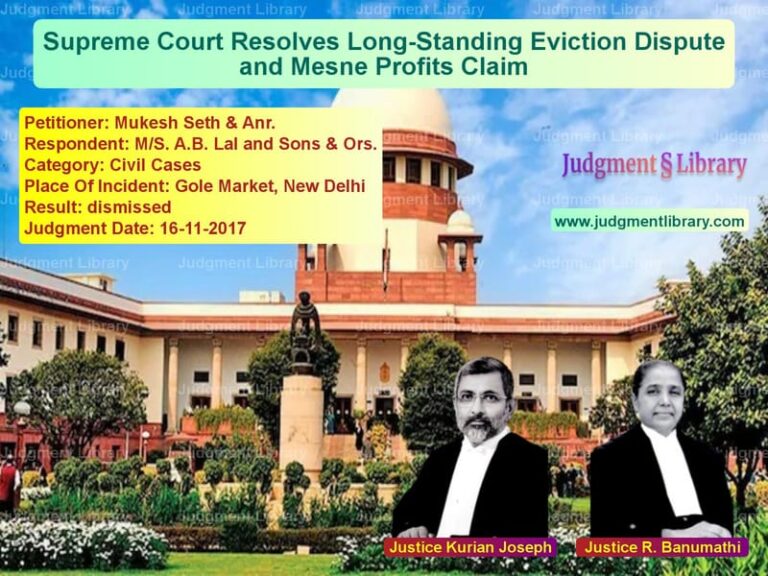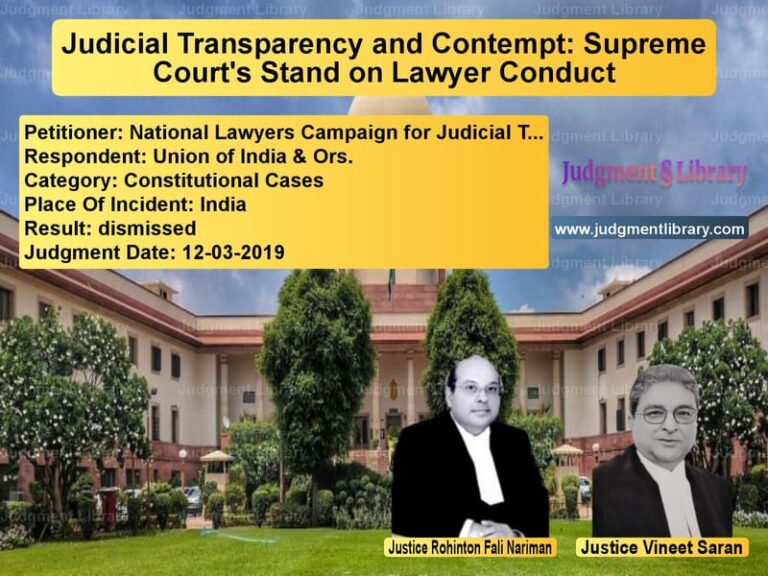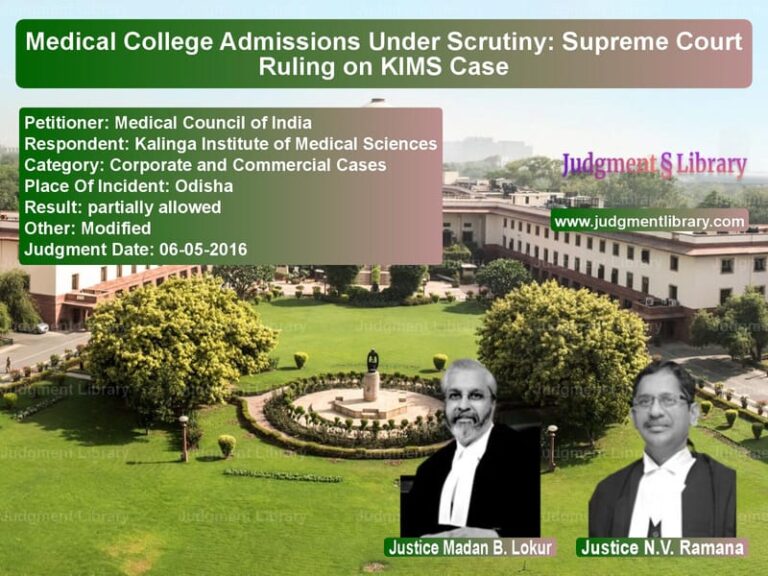Supreme Court Upholds Reinstatement of Teacher Wrongfully Terminated
Introduction
The Supreme Court of India, in the case of Municipal Council, Nangal & Ors. v. Aruna Saini, delivered a crucial judgment addressing the wrongful termination of a teacher. The Court upheld the reinstatement of the respondent, Aruna Saini, and ruled that she was entitled to partial back wages and full employment benefits.
The decision highlights the importance of procedural fairness in employment termination cases, particularly in government institutions.
Background of the Case
The case involved a dispute over the termination of the respondent, who was employed as a Social Studies teacher at Shivalik NAC High School, Naya Nangal. The key facts are:
- The respondent was appointed on 20.07.1994 on a temporary basis to fill a leave vacancy.
- The vacancy arose when a permanent teacher, Smt. Raj Verma, went on leave and later did not return.
- On 15.11.1994, Smt. Raj Verma was dismissed from service for unauthorized absence, and the respondent was made a permanent teacher.
- However, a clause in the respondent’s appointment stated that if Smt. Raj Verma were reinstated, the respondent would have no right to claim continued service.
- On 14.07.2003, Smt. Raj Verma was reinstated following a court order.
- The next day, 15.07.2003, the respondent was terminated from her position.
Following her termination, the respondent initially filed a writ petition in the High Court but later withdrew it and was granted permission to file a civil suit. She then approached the Additional Civil Judge (Sr. Division), Rupnagar, Nangal, seeking reinstatement.
Key Legal Issues Considered
The Supreme Court examined the following issues:
- Whether the termination of the respondent violated principles of natural justice.
- Whether she had a legitimate expectation of continued employment.
- Whether she was entitled to reinstatement and back wages.
Arguments by the Petitioner (Municipal Council, Nangal)
The petitioner, represented by legal counsel, argued:
- The respondent’s appointment was conditional on the reinstatement of Smt. Raj Verma.
- The termination was carried out as per the terms of her appointment.
- The respondent had no vested right to claim reinstatement.
Arguments by the Respondent (Aruna Saini)
The respondent contended:
- She had worked as a permanent teacher for nine years before her termination.
- Her termination was abrupt and violated principles of natural justice as she was given only 24 hours’ notice.
- Considering her long service, she should have been absorbed into an available vacancy.
Supreme Court’s Observations
The Supreme Court found that the termination violated principles of natural justice. The Court observed:
“The termination of the respondent’s services is in clear violation of principles of natural justice as reasonable opportunity was not given to her to furnish an explanation.”
Further, the Court held that the abrupt manner in which the respondent was dismissed was unjustified:
“Admittedly, notice of a mere 24 hours was given to the respondent before the order of termination was passed.”
The Supreme Court also criticized the employer’s failure to adjust the respondent into a vacant position following the retirement of Smt. Raj Verma:
“If the termination is bad in law, the respondent, in the normal course, would be entitled to reinstatement from the date of termination with all consequential benefits.”
Final Judgment
The Supreme Court ruled:
- The respondent was entitled to reinstatement effective from 01.09.2004.
- She would receive 50% of back wages from 01.09.2004 until the date of reinstatement.
- She would receive full salary and allowances from the date of reinstatement until retirement.
- Her service from 2004 onwards would be counted for pension calculations.
Significance of the Judgment
This ruling has critical implications:
- It reinforces the importance of following due process in employment termination cases.
- It emphasizes that long-serving employees should be given fair consideration for alternative employment.
- It upholds the judiciary’s role in protecting employees from arbitrary dismissals.
Implications for Employment Law
The judgment sets a precedent for future employment disputes:
- Employers must ensure that termination procedures comply with principles of natural justice.
- Employees who have served for long durations should be given priority for vacant positions.
- Arbitrary dismissals without due notice and opportunity for defense will not stand in court.
Conclusion
The Supreme Court’s decision in Municipal Council, Nangal & Ors. v. Aruna Saini is a landmark ruling that reinforces fair employment practices. By upholding the respondent’s reinstatement and awarding compensation, the Court has ensured justice for an employee wrongfully terminated. This judgment serves as a reminder that due process and fair treatment must be adhered to in employment matters.
Don’t miss out on the full details! Download the complete judgment in PDF format below and gain valuable insights instantly!
Download Judgment: Municipal Council, N vs Aruna Saini Supreme Court of India Judgment Dated 28-02-2017.pdf
Direct Downlaod Judgment: Direct downlaod this Judgment
See all petitions in Termination Cases
See all petitions in Employment Disputes
See all petitions in Judgment by S. A. Bobde
See all petitions in Judgment by L. Nageswara Rao
See all petitions in partially allowed
See all petitions in Modified
See all petitions in supreme court of India judgments February 2017
See all petitions in 2017 judgments
See all posts in Service Matters Category
See all allowed petitions in Service Matters Category
See all Dismissed petitions in Service Matters Category
See all partially allowed petitions in Service Matters Category

